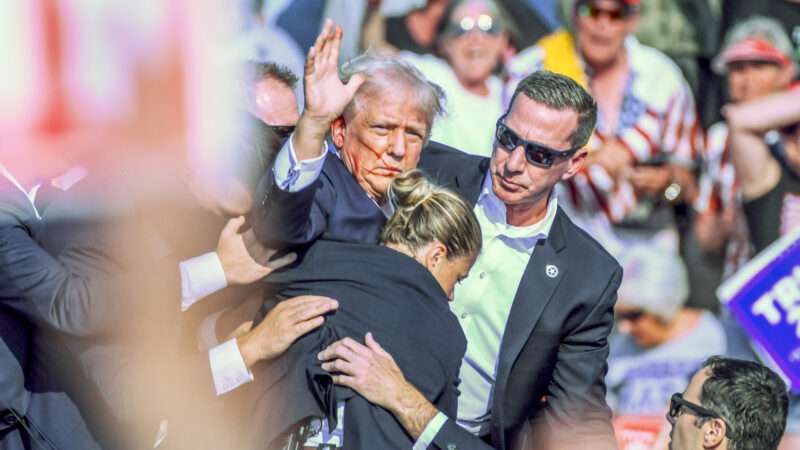
Less than a month after the attempted assassination of former President Donald Trump, the agency that failed to protect him from harm may get a bigger budget.
On July 13, when Thomas Matthew Crooks shot and wounded Trump during a campaign rally in Pennsylvania, Secret Service agents sprang into action, heroically shielding him from further harm and escorting him from the stage.
But subsequent reporting revealed that the incident was entirely preventable: Rally attendees alerted law enforcement to the presence of a suspicious person more than an hour before he started shooting, and they later saw him climbing on top of a building with a gun. "Trump was on stage for around 10 minutes between the moment Crooks was spotted on the roof with a gun and the moment he fired his first shot," the BBC reported.
After a particularly disastrous appearance before the House Oversight Committee, Secret Service Director Kimberly Cheatle resigned. Appearing before two Senate committees this week, acting Director Ronald Rowe Jr. testified that he was "ashamed" of the agency's failure.
Almost immediately after the shooting, a narrative emerged that the lapse owed to a lack of resources.
At a July 15 White House press briefing, a reporter asked Secretary Alejandro Mayorkas of the Department of Homeland Security—which oversees the Secret Service—"Is the Secret Service stretched too thin?"
"The Secret Service in—in times like this calls upon other resources and capabilities to handle a—a campaign of this magnitude," Mayorkas replied. "And I do intend to speak with members of the Hill with respect to the resources that we need."
"Our agency needs to be adequately resourced in order to serve our current mission requirements and to anticipate future requirements," Cheatle noted in her opening testimony before the House Oversight Committee on July 22. "As of today, the Secret Service has just over 8,000 employees," she told Rep. Stephen Lynch (D–Mass.). "We are still striving toward a number of 9,500 employees, approximately, in order to be able to meet future and emerging needs."
In a letter to Rowe this week, Sens. Chris Murphy (D–Conn.) and Katie Britt (R–Ala.)—respectively the chairman and the ranking member of the Senate Appropriations Subcommittee on Homeland Security—sought to understand the agency's financial needs as the subcommittee drafts an appropriations bill.
"Congress provided more than $190 million to the Secret Service in Fiscal Year 2024, specifically for protection requirements related to the 2024 presidential campaign, plus an additional $22 million above President Biden's budget request for protection-related travel costs," the senators wrote. "Despite this increase, in mid-June, prior to the attempted assassination, the Secret Service submitted a reprogramming notification to our subcommittee detailing its intent to shift $19 million to cover a shortfall for protection-related travel funding." This was in addition to the imminent addition of two vice presidential candidates and their families to the agency's protective purview, plus independent presidential candidate Robert F. Kennedy Jr., whom President Joe Biden added to the list after the shooting.
"As a result, the Secret Service is assuming new protection costs related to the campaign at a time when it already appears to lack sufficient resources to fulfill its protective mission," the senators continue.
But it's not at all clear that a lack of resources was the issue: The agency's budget in real numbers grew 55 percent over the last decade, to $3.62 billion, and its work force grew 33 percent from 2002 to 2019.
It is possible the agency may be stretched thin in its duties: The Secret Service is tasked by law with protecting not only the president, vice president, and their immediate families, but also former presidents, vice presidents, and their spouses for life, and their children until age 16. They also protect visiting heads of state and "other distinguished foreign visitors to the United States and official representatives of the United States performing special missions abroad when the President directs that such protection be provided."
"The Secret Service currently protects 36 individuals on a daily basis, as well as world leaders who visit the United States," Cheatle told the House Oversight Committee.
But that's not the agency's only job: Agents are tasked with investigating a number of financial crimes like counterfeiting, money laundering, and identity theft, as well as ransomware attacks, botnets, and "online sexual exploitation and abuse by predators and other criminals, sometimes for financial gain."
It's possible that the Secret Service is doing too many jobs for the amount of resources it enjoys. Perhaps many of its financial and investigative tasks should be shifted to the U.S. Treasury Department, which is where the Secret Service originated before Congress added presidential protection to its plate in 1901. The numbers demonstrate that the agency's problem is not purely financial.
But it's also worth keeping in mind that government agencies, by their nature, do too much, too poorly, and for too much money. The Secret Service, for all the nobility of its mission, is no exception.
The post Secret Service May Get Even More Money After Failing To Protect Trump appeared first on Reason.com.







